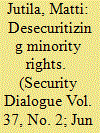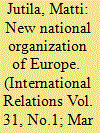| Srl | Item |
| 1 |
ID:
072544


|
|
|
|
|
| Publication |
2006.
|
| Summary/Abstract |
The article discusses Paul Roe's argument that minority rights are always problems of (societal) security. According to Roe, a Huysmanstype deconstructivist strategy, which can be used in desecuritization of migration, is not possible in minority situations, because maintenance of a collective identity is central for minorities; therefore, the desecuritization of minority rights may be 'logically impossible' in certain cases. The present article focuses on Roe's arguments and attempts to find ways to avoid his determinism. It introduces a reconstructivist strategy for the desecuritization of minority rights, based on the process and discursive aspects of identity. It is possible for the stories of ethnically defined collective identities to be told in such a way that they do not exclude other such identities from the territory of a state. With this strategy, the author tries to show that desecuritization of minority rights is always logically possible, though in some cases it might be practically impossible in the foreseeable future.
|
|
|
|
|
|
|
|
|
|
|
|
|
|
|
|
| 2 |
ID:
152334


|
|
|
|
|
| Summary/Abstract |
Post–Cold War Europe witnessed the resurgence of different forms of nationalism and also the re-establishment of a minority rights regime. At the surface level, rights of national minorities seem to undermine nationalism as a political organization principle, but on a closer investigation the relationship between the two is more complex. This article uses insights from the English school’s theorizing on primary and secondary institutions to investigate the relationship between the primary institution of nationalism and secondary institution of minority rights regime. After a brief discussion of nationalism as a primary institution and its influence on the implementation of universal human rights, this article presents a detailed study of the minority rights regime analysing how it challenges, transforms and reproduces nationalism as a primary institution of contemporary European society of states.
|
|
|
|
|
|
|
|
|
|
|
|
|
|
|
|